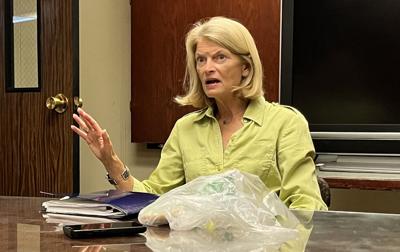Sen. Lisa Murkowski has voiced her opinion on affirmative action in colleges following the Supreme Court’s recent decision to end it. She says that diversity in all forms should be a top priority but that it should be achieved through an “organic approach” versus a more formulaic one.
“What I think we have seen as a consequence of that recent Supreme Court decision is a real evaluation of our colleges and universities as to how we ensure that these academic institutions reflect the real world, that they don’t just look like one homogeneous group,” Murkowski said in a meeting with the News-Miner on Tuesday. “So how can we really ensure that we are encouraging, to the maximum extent possible, the diversity that has always made this country so great in the first place.”
She emphasized the importance of being with and learning from peers of different political perspectives, cultures and socioeconomic backgrounds.
For the past 50 years, there has been a precedent of allowing college admissions to select students based on race as long as the intention of the colleges is to diversify their student body, not promote division. On June 29, the Supreme Court ended that by prohibiting college admissions from looking at race at all.
Multiple colleges have said that they will take advantage of a loophole in the ruling. The loophole is that while admissions cannot ask what an applicants’ race is, they can ask about the role that their race has played in their life and any race-related struggles they have experienced in their life.
This will mainly affect top colleges such as Yale University, Brown University, Columbia University, the University of Pennsylvania, the University of Chicago and Dartmouth College.
“Maybe the first step is to end legacy mission status,” Murkowski said. “You’re basically giving preferential status, and you’re thinking to yourself, well, what difference will that make? But then you think, no, I mean, really what you’re doing here is you’re perpetuating or you’re allowing to perpetuate, the same group that you’ve had for maybe 100 years.”
Murkowski highlighted not just the effect that this change will have on universities but on business and on our society as a whole. She noted that she and Susan Collins are the only Republicans that are for ratifying the Equal Rights Amendment.
“When people ask me why, they said, don’t you think that women are of equal protection, equal status? And I said, well, look around you, because in the place where I work, the United States Congress, 25% of Congress is women. Well, women are half the country. So when we get to about 50%, I’d say we’re doing OK.”
Murkowski said that there are currently no affirmative action-related laws she knows of being developed.
“Look at the wage gap, the pay disparity. It used to be $0.67 that a woman would earn to every man’s dollar. And now I think it’s about $0.76, $0.77, depending on where you are,” Murkowski said. “But that’s not parity yet. So how do we achieve diversity not only based on sex, but also the diversity that we want within our broader community reflected? It’s a good challenge for us. I think we’ve made some good progress, but we’ve got more to do.”

